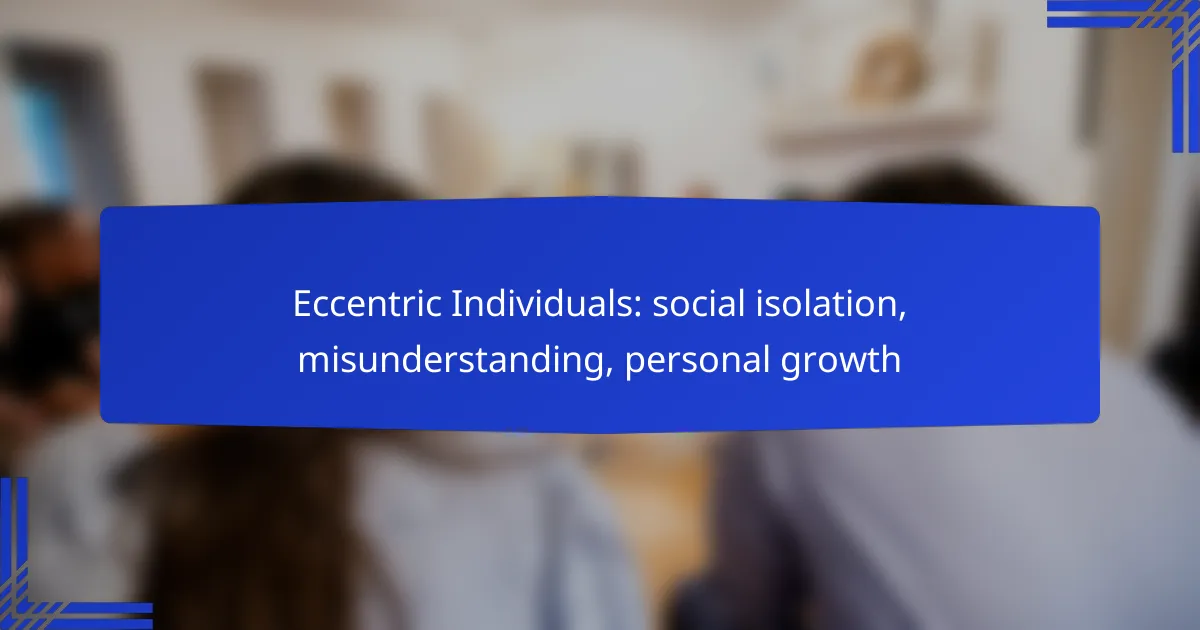Eccentric individuals often navigate a complex landscape of social isolation and misunderstanding, as their unique behaviors and perspectives can lead to misconceptions. However, by actively seeking supportive communities and engaging in activities that resonate with their interests, they can foster personal growth and reduce feelings of loneliness. This journey often reveals their creative expression and resilience, highlighting the beauty of their unconventional approaches to life.
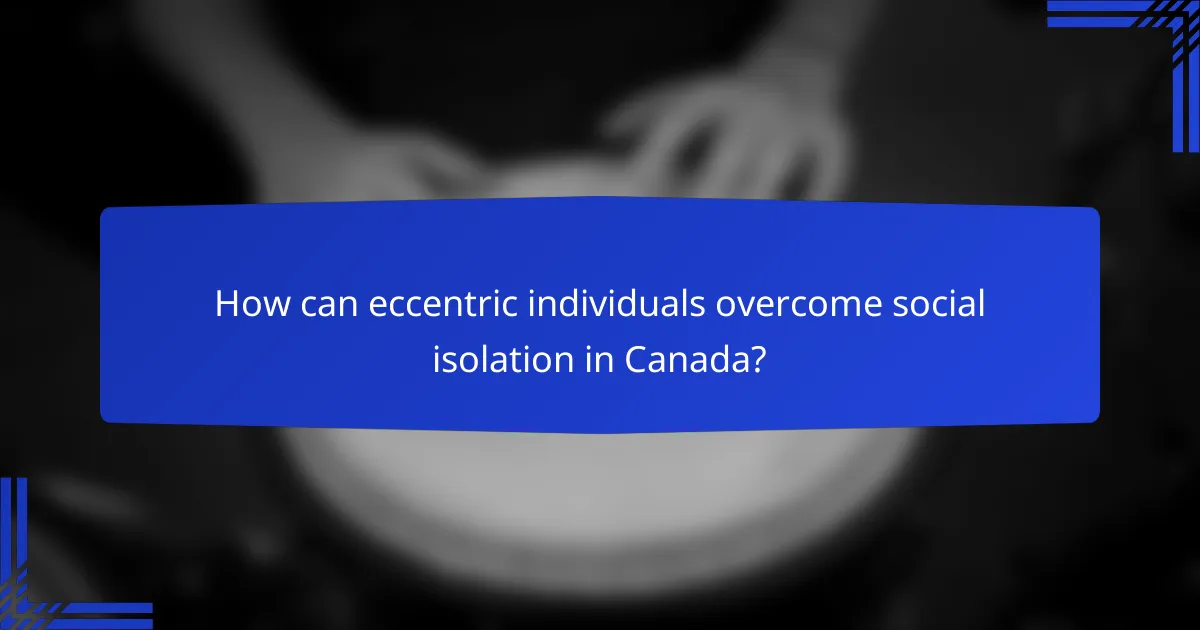
How can eccentric individuals overcome social isolation in Canada?
Eccentric individuals in Canada can overcome social isolation by actively seeking out supportive communities and engaging in activities that resonate with their unique interests. Building connections through shared experiences and understanding can foster personal growth and reduce feelings of loneliness.
Community support groups
Community support groups provide a safe space for eccentric individuals to connect with like-minded people. These groups often focus on specific interests or challenges, allowing participants to share experiences and advice. Look for local organizations or meetups that cater to niche hobbies or lifestyles.
In Canada, many cities have community centers that host regular meetings for various support groups. Joining these groups can help individuals feel less isolated and more understood.
Online forums and platforms
Online forums and platforms offer a convenient way for eccentric individuals to connect with others across Canada and beyond. Websites like Reddit, specialized Facebook groups, and niche forums allow users to discuss their interests and experiences without geographical limitations.
Participating in these online communities can provide valuable insights and support, making it easier to find friends who share similar passions. Just be mindful of online etiquette and safety when engaging with strangers.
Local art and culture events
Attending local art and culture events can be an excellent way for eccentric individuals to meet others who appreciate creativity and uniqueness. Events such as art exhibitions, theater performances, and music festivals often attract diverse crowds, providing opportunities for meaningful interactions.
Check local event listings or community boards for upcoming activities. Participating in workshops or classes can also foster connections while allowing for personal expression.
Therapeutic practices
Engaging in therapeutic practices can help eccentric individuals manage feelings of isolation and promote personal growth. Activities such as art therapy, group therapy, or mindfulness meditation can provide emotional support and foster connections with others facing similar challenges.
Consider seeking out therapists or counselors who specialize in working with eccentric individuals or those experiencing social isolation. Many practitioners in Canada offer sliding scale fees, making therapy more accessible.
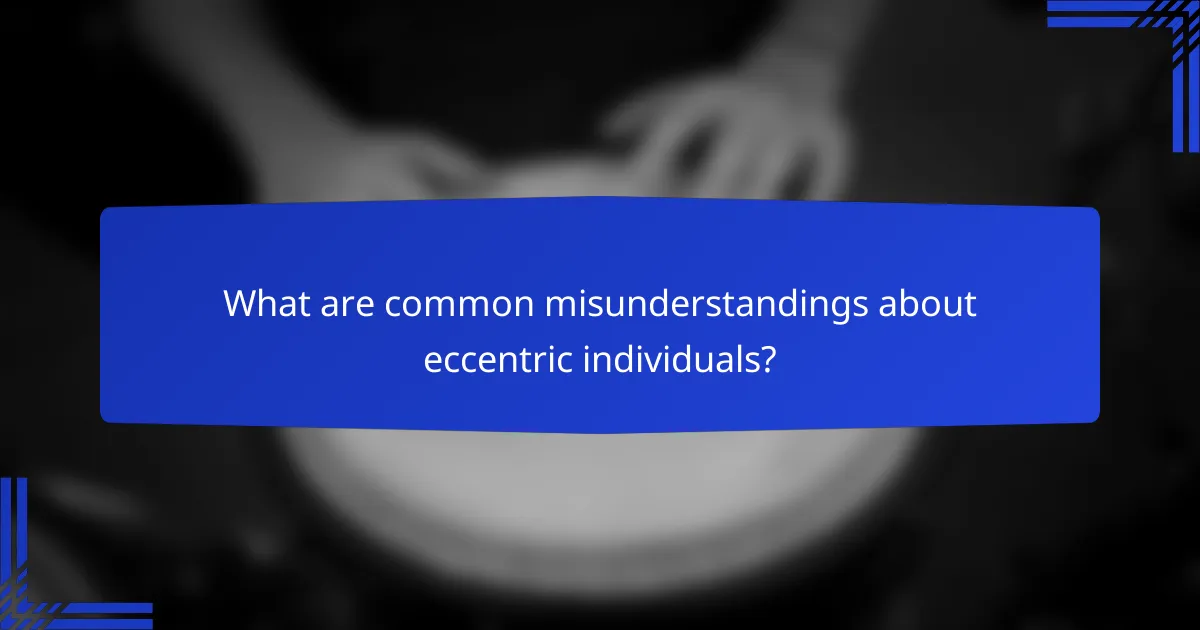
What are common misunderstandings about eccentric individuals?
Eccentric individuals often face misunderstandings that stem from their unique behaviors and perspectives. These misconceptions can lead to social isolation and hinder personal growth, as society may misinterpret their actions or intentions.
Misinterpretation of behavior
Many people misinterpret the behaviors of eccentric individuals as signs of mental instability or social ineptitude. For instance, someone who prefers solitude or has unconventional interests may be viewed as antisocial. This misunderstanding can prevent meaningful connections and support from forming.
It is crucial to recognize that eccentricity can manifest in various ways, such as unique fashion choices or unconventional hobbies. These traits often reflect personal authenticity rather than a lack of social skills. Understanding this can foster acceptance and reduce stigma.
Stereotypes in media
Media portrayals of eccentric individuals often reinforce negative stereotypes, depicting them as quirky or unreliable. Such representations can shape public perception, leading to a narrow view of what it means to be eccentric. This can further alienate those who do not fit conventional molds.
Examples include characters in films and television shows who are portrayed as comic relief or misunderstood geniuses. These stereotypes can overshadow the real-life complexities and strengths of eccentric individuals, making it essential to seek diverse narratives that highlight their contributions and experiences.
Lack of awareness in communities
Communities often lack awareness and understanding of eccentricity, which can lead to exclusion and discrimination. This lack of awareness can manifest in social settings where eccentric individuals may feel unwelcome or judged for their differences. Education and open dialogue are vital in fostering a more inclusive environment.
Encouraging community events that celebrate diversity and individuality can help bridge the gap. Workshops, discussions, and support groups can provide platforms for eccentric individuals to share their experiences and for others to learn about the value of different perspectives.
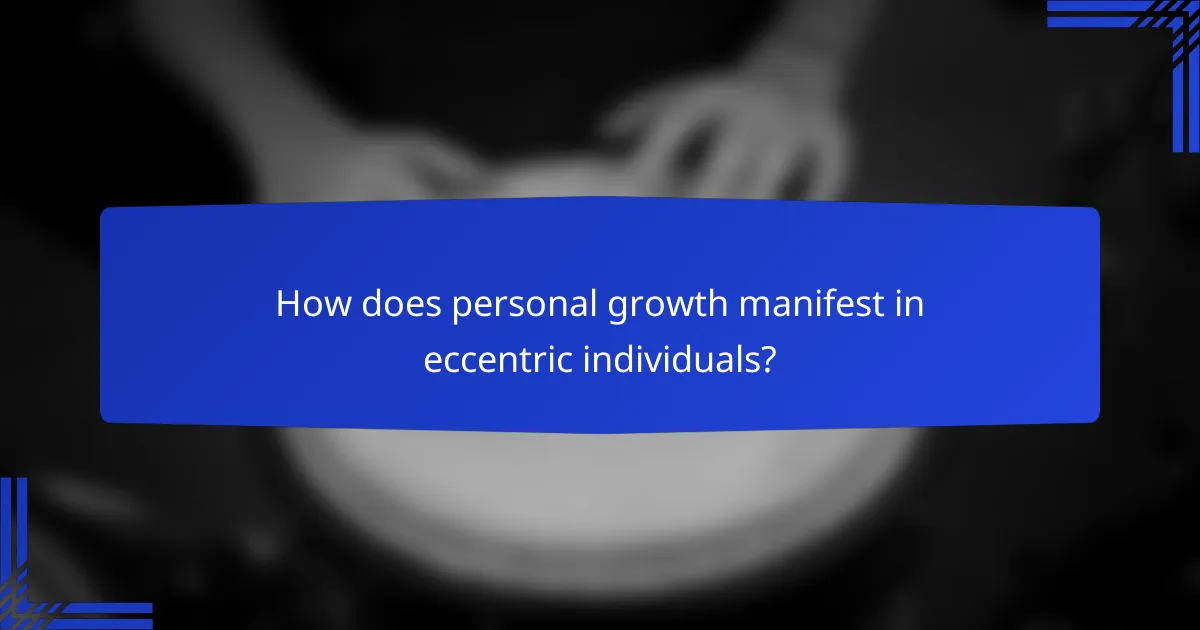
How does personal growth manifest in eccentric individuals?
Personal growth in eccentric individuals often reveals itself through unique perspectives and unconventional approaches to life. This growth can be seen in their creative expression, resilience in the face of challenges, and journeys of self-discovery.
Creative expression
Eccentric individuals frequently channel their distinct viewpoints into creative outlets, such as art, music, or writing. This expression not only serves as a means of communication but also as a therapeutic process that fosters personal growth.
For example, an eccentric artist may explore unconventional themes in their work, challenging societal norms and inviting others to see the world differently. Engaging in creative activities can enhance self-esteem and provide a sense of purpose.
Resilience through adversity
Many eccentric individuals face social isolation or misunderstanding, which can lead to significant challenges. However, these experiences often cultivate resilience, allowing them to develop coping strategies and a deeper understanding of themselves.
For instance, someone who has been marginalized may learn to embrace their uniqueness and find strength in their differences. This resilience can manifest in various ways, such as pursuing personal goals despite setbacks or advocating for others who feel similarly isolated.
Self-discovery journeys
The path of self-discovery is often integral to the personal growth of eccentric individuals. They may embark on journeys that involve exploring their interests, values, and beliefs, leading to a more authentic self-expression.
These journeys can take many forms, from traveling to new places to engaging in introspective practices like journaling or meditation. By reflecting on their experiences, eccentric individuals can gain insights that enhance their understanding of themselves and their place in the world.

What role does therapy play for eccentric individuals?
Therapy can be a vital resource for eccentric individuals, helping them navigate social isolation and misunderstandings while fostering personal growth. Through various therapeutic approaches, these individuals can gain insights into their behaviors and develop coping strategies to enhance their well-being.
Individual counseling
Individual counseling provides a safe space for eccentric individuals to explore their thoughts and feelings without judgment. This one-on-one interaction allows for personalized strategies that address specific challenges, such as anxiety or social discomfort.
Therapists often use cognitive-behavioral techniques to help clients reframe negative thoughts and develop healthier coping mechanisms. Regular sessions can lead to increased self-awareness and improved emotional regulation.
Group therapy benefits
Group therapy offers eccentric individuals the opportunity to connect with others who share similar experiences, reducing feelings of isolation. Participants can benefit from shared stories and support, fostering a sense of community.
Engaging in group discussions can enhance social skills and provide diverse perspectives on personal issues. It is essential to choose a group that aligns with individual needs, whether it’s focused on creativity, social skills, or emotional support.
Art therapy approaches
Art therapy allows eccentric individuals to express themselves creatively, often leading to breakthroughs in self-understanding. This form of therapy can be particularly beneficial for those who struggle with verbal communication, as it provides alternative means of expression.
Common techniques include painting, drawing, and sculpture, which can help individuals process emotions and experiences. Art therapy sessions can be tailored to individual preferences, making it a versatile option for personal growth and healing.
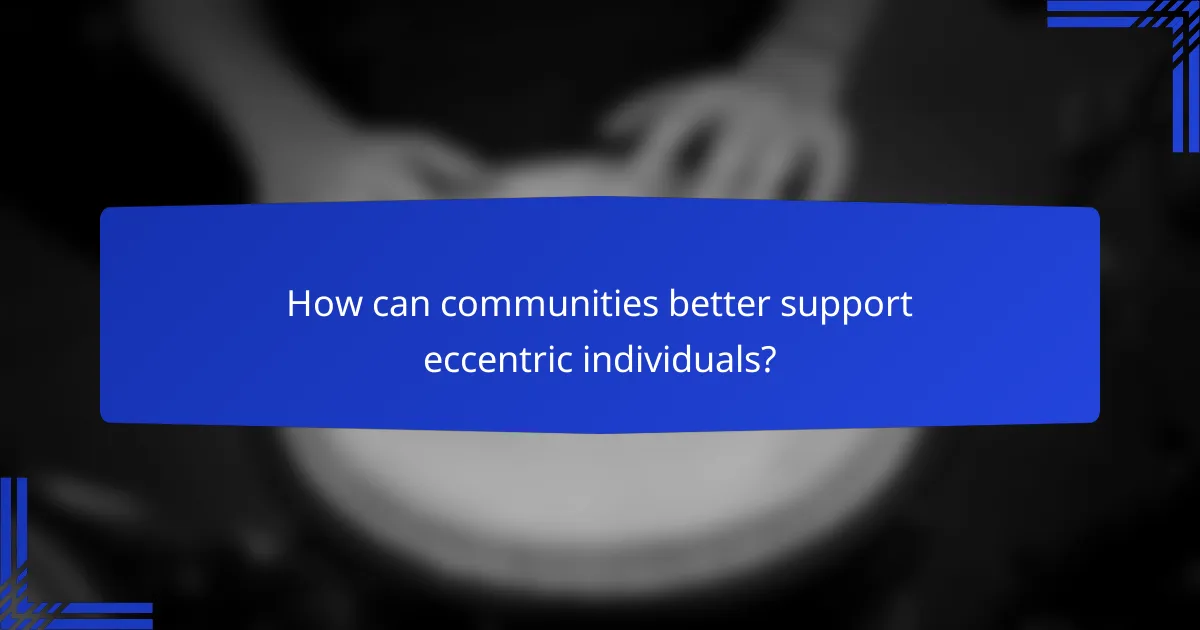
How can communities better support eccentric individuals?
Communities can support eccentric individuals by fostering inclusive environments that embrace diversity and promote understanding. This involves creating programs that encourage social interaction, provide resources, and facilitate personal growth.
Inclusive community programs
Inclusive community programs are designed to engage eccentric individuals by providing spaces where they can connect with others who share similar interests. These programs can include art classes, book clubs, or hobby groups that cater to unique passions, allowing participants to express themselves freely.
To be effective, these programs should be accessible and welcoming, ensuring that all individuals feel valued. Consider offering sliding scale fees or free events to eliminate financial barriers, and promote these programs through local channels to reach a wider audience.
Additionally, training staff and volunteers on the importance of inclusivity can enhance the experience for eccentric individuals. This training can include sensitivity workshops and strategies for fostering open communication, ensuring that everyone feels heard and understood.
